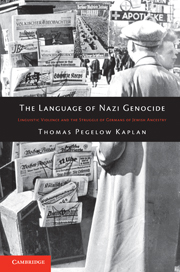Book contents
- Frontmatter
- Contents
- Illustrations
- Acknowledgments
- Abbreviations
- Introduction
- 1 “We Are All Germans; Why Then Ask for Religion?”: Cultural Identity, Language, and Weimar Pluralism, 1928–1932
- 2 “Racial and Social Boundaries between Germans and Jews Are to Be Strictly Drawn”: Dictatorship Building and the Process of Nazifying Language, 1933
- 3 Toward the Eradication of the “Impossible, Untenable Category of ‘German Jews’”: Enforcing and Contesting Racial Difference, 1935–1938
- 4 “The Jewess” Attempted to “Stage a Case on Her Descent”: Linguistic Violence as Part of Genocide, 1941–1945
- 5 “We Are Not Bad Jews, Because We Believe We Are Good and True Germans”: Another Beginning and Persisting Difference, 1945–1948
- Conclusion
- Appendix: Frequency of Key Categories of Germanness and Jewishness
- Bibliography
- Bibliographical Essay
- Index
- References
Conclusion
- Frontmatter
- Contents
- Illustrations
- Acknowledgments
- Abbreviations
- Introduction
- 1 “We Are All Germans; Why Then Ask for Religion?”: Cultural Identity, Language, and Weimar Pluralism, 1928–1932
- 2 “Racial and Social Boundaries between Germans and Jews Are to Be Strictly Drawn”: Dictatorship Building and the Process of Nazifying Language, 1933
- 3 Toward the Eradication of the “Impossible, Untenable Category of ‘German Jews’”: Enforcing and Contesting Racial Difference, 1935–1938
- 4 “The Jewess” Attempted to “Stage a Case on Her Descent”: Linguistic Violence as Part of Genocide, 1941–1945
- 5 “We Are Not Bad Jews, Because We Believe We Are Good and True Germans”: Another Beginning and Persisting Difference, 1945–1948
- Conclusion
- Appendix: Frequency of Key Categories of Germanness and Jewishness
- Bibliography
- Bibliographical Essay
- Index
- References
Summary
Between the late 1920s and the late 1940s, Germans with and without Jewish ancestors lived through three distinct political systems and regimes of language. They experienced the struggling democracy of the Weimar years, confronted the radical changes of the Nazi dictatorship, and grappled with Nazism's legacies to search for a place in an Allied-occupied country. These men and women also encountered the making and remaking of the categories, definitions, and meanings of Germanness and Jewishness, which for many meant consuming what Victor Klemperer described as “tiny doses of arsenic.” The country's population, however, did not simply “swallow” them “unnoticed.”
This book has made the often intense conflicts over the production of Germanness and Jewishness the focal point of its analysis. In so doing, it has steered away from relying on an a priori “ethnic absolutism” that underpins the view of German and Jewish identities as timeless, fixed, and diametrically opposed to one another. In Weimar, Nazi, and early postwar Germany, the boundaries of these categories, defined at different times as religious, cultural, and racial, constantly shifted. Government administrators, political and community activists, scientists, journalists, and ordinary Germans with and without Jewish ancestors engaged the complex, competing, and overlapping discourses on the “German” and “Jewish Questions.” As cultural theorists have demonstrated, German Gentiles and Jews did not neutrally grasp social and political developments; the words they used and cited within the limits of available discourses rather produced complex realities and reinforced or changed identities.
- Type
- Chapter
- Information
- The Language of Nazi GenocideLinguistic Violence and the Struggle of Germans of Jewish Ancestry, pp. 272 - 280Publisher: Cambridge University PressPrint publication year: 2009



